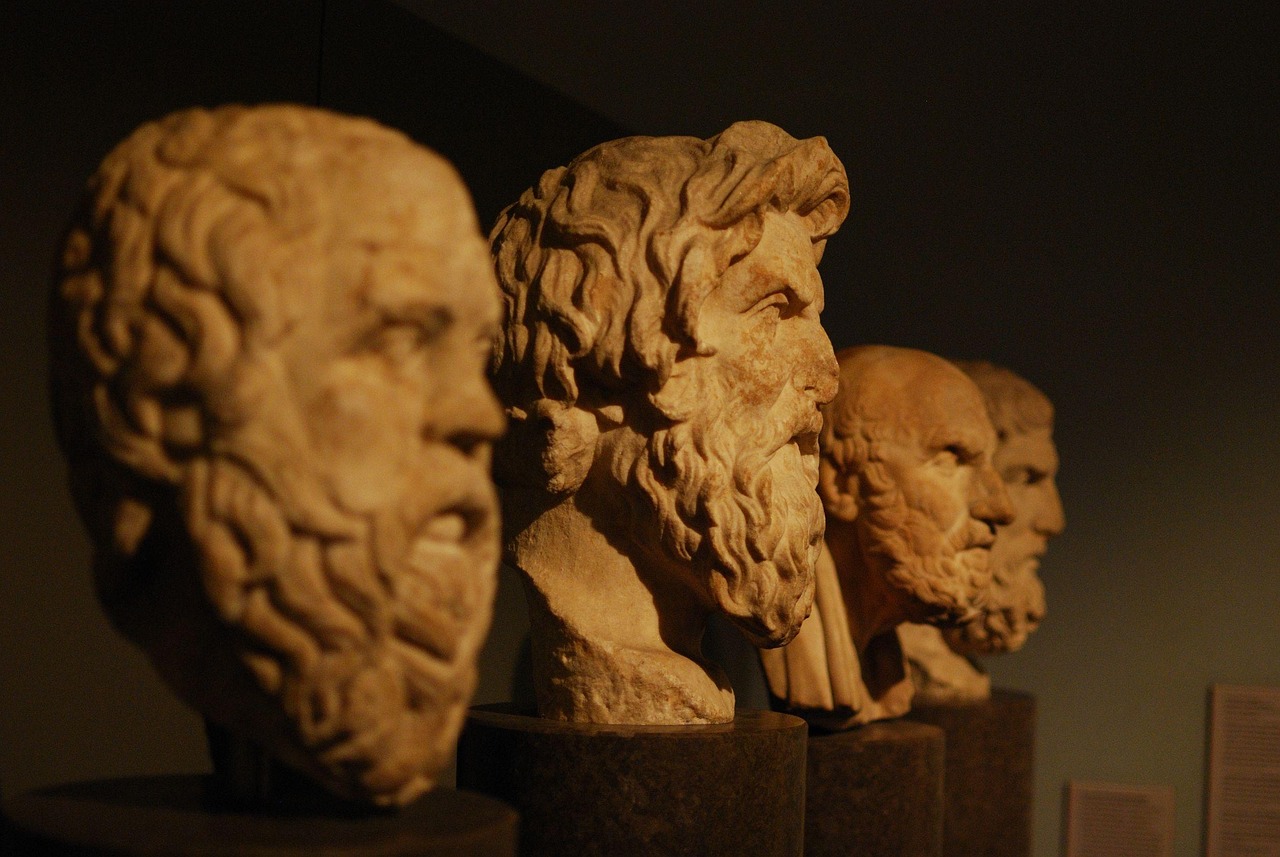Long before Socrates posed his probing questions about ethics and society, there was a bold generation of thinkers who sought to untangle the mysteries of existence itself. These early Greek philosophers—now called the Presocratics—set their sights on the cosmos, the elements, and the underlying principles that govern reality. They turned away from mythology’s comforting narratives and sought explanations rooted in reason and observation. It was an audacious shift: to imagine a world driven not by the whims of gods but by intelligible laws.
At the heart of their inquiries was the search for the arche—a fundamental substance or principle from which all things originate. For Thales, it was water; for Heraclitus, an ever-changing fire; and for the Atomists, countless indivisible particles dancing in a void. They asked questions no one had dared to ask and, in doing so, laid the groundwork for both philosophy and science. These were not mere speculators; they were architects of thought, designing tools that continue to shape how we understand existence today.
Table of Contents
The Origins of Presocratic Philosophy
When we think about the origins of philosophy, it’s hard not to marvel at the shift that took place during the 6th and 5th centuries BCE in ancient Greece. This era marked the beginning of something revolutionary—the move from mythological explanations to rational thought. These early philosophers didn’t settle for stories about gods controlling winds and seas; instead, they searched for answers rooted in logic and observation. The Presocratics were, in many ways, the first people to look at the world with a scientific mindset, paving the way for everything we understand about philosophy today.
Historical Context
To fully appreciate Presocratic philosophy, we need to grasp the world these thinkers lived in. Ancient Greece during this period was a patchwork of city-states (or poleis), such as Athens, Sparta, and Miletus. Each city-state functioned independently, yet they shared a common culture, language, and pantheon of gods. The Greeks’ strong maritime economy and extensive trade networks brought them into contact with different ideas and cultures, creating fertile ground for intellectual growth.
But what triggered the leap from myth to reason? Mythology had long been the framework civilizations used to explain natural phenomena. Thunder was Zeus’s wrath; the seasons were Demeter’s grief. Then came the Presocratics, who dared to strip away these myths, asking instead: What if the world operated according to principles we can uncover?
The intellectual climate was ripe for such a narrative shift. Advances in technology and mathematics, including the influence of Babylonian astronomy, fueled curiosity about natural order. Simultaneously, local traditions of storytelling and debate honed the Greeks’ rhetorical ability to dissect complex ideas. The emergence of Presocratic philosophy wasn’t a sudden upheaval—it was a slow turning of gears, a natural product of its time. For a deeper look into its historical backdrop, you can explore more about the context of Presocratic thought.
Thales and the Milesian School
At the forefront of this intellectual awakening was Thales of Miletus, regarded as the first philosopher in Western history. Born in the bustling Ionian city of Miletus, located in modern-day Turkey, Thales is best known for his audacious claim: water is the arche—the fundamental substance from which all things are derived. To us, it might sound simplistic, but to the Greeks, it was groundbreaking. For the first time, someone tried to explain the world’s composition not through gods or myths, but through observable, natural principles.
Thales’ theory wasn’t just about water; it opened the door to an entirely new way of thinking. He demonstrated that the world could be examined systematically, and this act of critical reasoning formed the cornerstone of the Milesian School. Thales’ successors, Anaximander and Anaximenes, expanded on his ideas. Anaximander posited the apeiron—an indefinite, boundless substance—as the origin of all things, while Anaximenes suggested air as the basic element. These thinkers didn’t just theorize; they debated, argued, and refined their concepts.
The Milesian School marked the first real attempt at cosmology—the study of the universe’s structure and origin. Their ideas, though limited by the tools of their time, laid the groundwork for scientific exploration. Miletus became not just a physical hub of trade but an intellectual hub, a place where questions about existence were born. Learn more about these early pioneers of thought here.
What made the Milesian School so remarkable was not just their hypotheses but their method. They didn’t rely on divine revelation or inherited wisdom. Instead, they observed, hypothesized, and revised—a process strikingly similar to the scientific method we hold today. Their courage to think differently made them the architects of a new intellectual era, one rooted in rational investigation rather than mythological creativity.
Core Concepts of Presocratic Philosophy
Presocratic thinkers revolutionized the way we explore life’s great questions. Instead of relying on divine myths, they pioneered logic and observation to explain the universe. Their ideas dug into fundamental principles—questions so profound that even today, they form the bedrock of philosophical inquiry.
The Arche: The Search for First Principles
What is the origin of everything? If you could strip the universe down to its most essential ingredient, what would remain? For the Presocratics, this question was everything, and their answer was the arche—the foundational principle of all existence.
Thales, often celebrated as the first philosopher, boldly asserted that water is the arche. His reasoning? Water is a source of life and transformation, seen in rivers feeding crops or the sea harboring life. It was a poetic and theoretical leap.
Thales’ successors weren’t content with water as the ultimate substance. Anaximander argued for the apeiron—an infinite, boundless substance embodying all possibilities. This concept of an indefinite origin reflected a vision of the cosmos that transcends traditional elements. Anaximenes, meanwhile, returned to tangible substance, positing that air formed the universe through processes of condensation and rarefaction. From these diverse interpretations, it’s clear the Presocratics weren’t just searching for answers but for the right kind of question to ask.
For a deeper exploration of the arche and its significance, visit Presocratics.

Photo by DS stories
Heraclitus and the Principle of Change
Ever felt like you’re paddling against the shifting current of life? Heraclitus understood this feeling. For him, existence was flux. Change, he argued, is the only constant. He captured this poetic yet unsettling truth with his famous metaphor: “You cannot step into the same river twice.”
To explain this ever-unfolding reality, Heraclitus turned to fire—a symbol of transformation that consumes and creates. Fire’s flickering chaos mirrored his concept of the logos, the rational principle underlying all change. It’s not random, he explained; everything balances through a unity of opposites. For instance, day and night, life and death—they seem to contradict each other until you realize they’re part of the same cycle.
Heraclitus’ ideas challenge static views of existence. His philosophy compels us to ask whether the stable world we perceive is just an illusion veiling the wild dance of change beneath.
More insights on Heraclitus and flux can be found here.
Parmenides and the Nature of Being
Where Heraclitus saw rivers in motion, Parmenides saw a tranquil sea—unchanging, eternal, and whole. To him, being could not arise from non-being. Change, therefore, is an illusion. Imagine this: You’re watching a movie. It feels alive, dynamic, and fluid, right? Parmenides might say your senses deceive you—it’s just frames of still pictures flashing before your eyes.
Parmenides rejected the sensory experience of reality, claiming true knowledge comes from reason alone. His argument stands as a bold counterpoint to Heraclitus’ worldview. Where Heraclitus embraced movement, Parmenides clung to stasis. The philosophical tug-of-war between these perspectives shaped centuries of thought.
Curious to dive deeper? Explore these contrasts and more here.
Atomists: Leucippus and Democritus
If Heraclitus and Parmenides represented extremes, the Atomists, Leucippus and Democritus, charted a middle ground. They proposed a cosmos composed of indivisible particles—atoms—moving within an infinite void. Think of it like a Lego universe, where everything, no matter how grand or tiny, is made of the smallest possible building blocks.
Their systematic approach was startlingly modern. Atoms, they argued, varied in shape and size but were indestructible. These constants combined and separated to create all things, from stars to shoes. Unlike the divine forces often attributed to existence, their philosophy removed spiritual causality, laying the groundwork for naturalism.
The Atomists weren’t just philosophers; they were proto-scientists. Their theories echoed through history and reemerged much later in scientific revolutions. A closer look reveals their profound influence on the natural sciences—read more here.
Impact on Later Philosophy and Science
The profound insights of Presocratic philosophers reverberated far beyond their time, shaping the trajectory of Western thought. They weren’t just asking questions about the universe—they were setting the stage for how humanity approaches knowledge itself. Their emphasis on natural explanations, logical reasoning, and a systematic study of the world left a legacy that would deeply influence both philosophy and science.
Cosmology and Natural Sciences
The Presocratics were the first to dare to explain the universe in terms of observable phenomena instead of divine intervention. They laid the groundwork for cosmology and physics, fields that strive to understand the nature and origin of the universe. By proposing that the cosmos operates through natural laws, they challenged humanity to seek out patterns and principles rather than accepting brute mysteries.
Take Anaximander, for example. His bold hypothesis of the apeiron—the “indefinite” or “boundless” substance—as the origin of all existence showcased an early attempt at explaining the universe’s formation in abstract, almost theoretical terms. He even suggested that the Earth was suspended in space, an incredible leap of imagination. Others followed suit: Pythagoras, who linked mathematical harmony to the structure of the cosmos, and Democritus, whose atomic theory later inspired modern physics.
Without tools, telescopes, or labs, these thinkers were paving roads that would, centuries later, lead to breakthroughs like Copernicus’s heliocentrism and Newton’s law of gravity. Their work helped establish the idea that the world could be understood systematically—a principle foundational to the methods of science today. For more on their contributions to cosmology, you can explore this overview.
Philosophical Legacy
While their scientific influence often steals the spotlight, the Presocratics were equally transformational in philosophy. They forced humanity to wrestle with concepts like existence, change, and the nature of truth. They asked questions that stretched beyond what was visible or tangible, crafting abstract frameworks that still inform debates in metaphysics, epistemology, and ethics.
Heraclitus’s philosophy of perpetual change, centered on the ever-present logos, taught us to see the world as inherently dynamic. This idea rippled into Plato’s dialogues, where the tension between permanence and change became a recurring theme. And then there’s Parmenides, who argued that reality is one indivisible whole—unchanging and eternal. Plato echoed these ideas in his theory of the eternal Forms, while Aristotle sought to reconcile the two by asserting that change is real, but it unfolds within a framework of underlying principles.
Even ethics owes a quiet debt to the Presocratics. Their focus on rational explanations for natural phenomena set a tone for exploring human behavior and morality through reason rather than dogma. The groundwork they laid allowed later thinkers like Socrates to delve deeper into questions of virtue and the good life. You can explore the philosophical significance of their thought further in this detailed analysis.
Through their monumental courage to think differently and question the unthinkable, the Presocratics became the architects of human inquiry. Each hypothesis they crafted, and every question they dared to ask, echoes through the ages—reminding us that our quest to understand is both timeless and indispensable.
Criticism and Limitations of Presocratic Thought
The Presocratic thinkers carved an intellectual foundation that still supports many of our modern explorations in philosophy and science. Yet, like any groundbreaking movement, their methods and ideas weren’t without flaws. To truly appreciate the brilliance of their contributions, one must also contend with their limitations. From piecing together incomplete records to grappling with their reliance on speculation, these challenges are as revealing as their triumphs.
Use of Fragmentary Evidence
Imagine trying to recreate the Sistine Chapel with only a handful of its original tiles. That’s the challenge historians and philosophers face when interpreting Presocratic philosophy. We don’t have their original writings; instead, we rely on fragments—bits and pieces quoted or paraphrased by later thinkers like Plato, Aristotle, or even occasional Roman commentators. This indirect transmission raises significant obstacles.
Later authors often introduced their own biases into how they preserved and interpreted Presocratic ideas. Aristotle, for instance, had a systematic approach that could distort the fluid and open-ended inquiries of the early philosophers. He often framed their theories in contrast to his own, making it hard to know whether we’re engaging with the Presocratics’ true ideas or Aristotle’s interpretation of them. The same issue arises with other sources, where fragments are stripped of their original context, making it difficult to piece together a cohesive worldview. If you’re interested in exploring this challenge further, you can read about the intricacies of their fragmentary nature here.
Additionally, there’s the basic question of survival. Written works from the 6th and 5th centuries BCE were exceptionally fragile. What didn’t succumb to time was vulnerable to wars, fires, and neglect. Modern philosophers thus find themselves playing detective, piecing together hazy outlines of thought from scattered remnants. It’s a bit like trying to reconstruct an ancient recipe with only a few ingredients and vague instructions—you’re left to guess much of the flavor.
Despite these hurdles, there’s something poetic about how the Presocratics’ works have reached us. Their ideas persist in echoes, challenging us with their partial truths and fragmented beauty. Each snippet forces us to set down our certainties and embrace the puzzle, however incomplete it may be.
Speculation and Lack of Empirical Evidence
While their inquiries were bold and imaginative, many Presocratic theories leaned heavily on speculation over grounded observation. They had no telescopes, microscopes, or mathematical tools to confirm their hypotheses. This absence of experimental validation often put their ideas closer to thought experiments than testable scientific models—and it’s here that their limitations become most apparent.
Take Thales’ claim that water was the arche, the fundamental substance of all things. It’s a fascinating idea, but it was based on observation and intuition rather than rigorous investigation. His reasoning—that water nourishes and sustains life, therefore it must constitute everything—feels almost poetic, but it’s far too simplistic when compared to what we know about chemistry today. Similarly, the Atomists, while impressively forward-thinking, had no tangible proof for their theories. Their infinitesimal particles were a product of imagination, not evidence.
This speculative tendency wasn’t entirely a flaw; it had its merits. The Presocratics were pioneers, asking questions no one had dared ask before. However, speculation without empirical grounding sometimes meant their ideas veered into the realm of the fantastical. Anaximander’s concept of the apeiron—an infinite, undefined substance—was brilliant but also abstract to the point of being unprovable. To their credit, they sought to explain the universe without recourse to gods or myths, but this lack of empirical rigor created a gap between their speculations and observable truths. You can discover more about their speculative methods here.
Their speculative nature also leaves space for criticism when viewed through today’s scientific lens. It’s easy, with hindsight, to dismiss early theories as naïve. Heraclitus’ idea that fire is the fundamental element or Anaximenes’ emphasis on air might feel quaint, even whimsical, in the face of modern atomic theory. But that criticism, however justified, glosses over a crucial fact: the Presocratics were trying to see the invisible—to grasp at truths beyond sensory perception. When you strip away the tools of modern science, nearly every advance starts as speculation.
So yes, their lack of empirical evidence was a limitation. But is it such a strange limitation? After all, all great ideas start as sparks of imagination, flickering in the dark until someone builds a lantern to hold them. And for the Presocratics, that flicker was enough to ignite a philosophical revolution.
Frequently Asked Questions on Presocratic Philosophy
The Presocratics often feel like the mysterious ancestors of Western philosophy. Their thoughts are fragmented, dispersed across time, yet their influence casts a long shadow. Who were these thinkers? What was their central quest? And why do their ideas echo even today? Let’s dive into these questions with clarity and curiosity.
Who Were the Presocratic Philosophers?
The Presocratics were the early Greek philosophers who lived and theorized before Socrates (hence the name). Emerging around the 6th century BCE, these thinkers laid the intellectual groundwork for science, philosophy, and rational thought. They sought answers not through myth or divine revelation but through observation and reasoning—this was their great leap.
Figures like Thales, Anaximander, Heraclitus, and Pythagoras belong to this pioneering group. Each came with their own obsessions: What is the nature of the world? Where do humans fit within it? What underpins existence itself? Thales, for example, posited that water was the fundamental substance of all things—an attempt to explain reality using a single principle. Others, like Parmenides, rejected change altogether, claiming that reality is eternal and unshifting.
These philosophers weren’t unified by a set of doctrines but by their boldness. They were the first to question the cosmos not with poetry but with logic, and their methods formed the blueprint for philosophical inquiry. If you’d like to explore more about their historical importance, this overview offers valuable insights.

Photo by Ann H
What is the Arche in Presocratic Philosophy?
Imagine peeling back the layers of existence, searching for a single piece that holds it all together. This was the Presocratics’ quest, and they called it the arche—the root, the beginning, the first principle of everything.
Thales believed water was the arche. Why? Because water seemed necessary for life, transformation, and continuity. This was more than symbolic; for Thales, water held the key to understanding the fabric of reality. But not everyone agreed. Anaximander speculated an indefinite substance, the apeiron, as the origin—a boundless and formless cause giving rise to all. Meanwhile, Anaximenes chose air, asserting that processes of condensation and rarefaction shaped the cosmos.
These debates weren’t just theoretical banter. They marked humanity’s first systematic attempt to grasp the universe through reasoning. Each thinker extended the conversation about what undergirds existence, paving ways that stretched beyond mythological creation stories. To dig into the concept further, take a look at this explanation about the arche.
How Did Presocratic Philosophy Influence Modern Thought?
If their ideas feel oddly familiar, it’s because they left a profound impact—not just on later philosophers like Plato and Aristotle but on the entire trajectory of Western thought. The Presocratics pushed human thinking from mythological to rational, from the gods to the elements, offering a framework that resonates even in today’s scientific and philosophical inquiry.
- Foundations of Science: By searching for natural explanations, the Presocratics cleared the path for disciplines like physics, astronomy, and cosmology. Consider their early efforts to understand the universe as governed by laws rather than divine whims—a cornerstone of scientific exploration.
- Shaping Philosophy: Philosophers such as Heraclitus and Parmenides influenced how we think about change and permanence. Their debates on flux versus stability inspired centuries of philosophical discussion, influencing giants like Hegel and Nietzsche.
- Mathematics and Logic: Pythagoras turned his gaze toward numbers, linking them to the structure of the cosmos. His work wasn’t just theoretical—it provides the foundation for much of modern mathematics.
The intellectual boldness of these thinkers rings through today, reminding us of the importance of curiosity and questioning. They viewed the world not for its surfaces but its depths—a gesture that transformed how humanity understands itself and its environment. For further exploration of their influence, this discussion offers a detailed perspective.
These early philosophers remind me that knowledge isn’t static; it’s a river that flows between questions and answers—a dynamic, evolving process. When faced with the fragments of their ideas, I’m struck by how much they saw despite having so little. They may not have had all the answers, but they dared to ask the right questions. And isn’t that where every good story begins?
Conclusion
Presocratic philosophy wasn’t just a chapter in the history of thought—it was the spark that lit the flame of Western intellectual tradition. Their audacity to seek principles beyond myth, to explain the universe through reason and observation, resonates even now. These thinkers offered us more than theories; they gave us a way to question, to wonder, to imagine a cosmos governed by discoverable truths.
Their fragmented echoes remind us of the beauty in beginnings, of the bravery it takes to ask questions without knowing where the answers might lead. Whether through Heraclitus’ fiery flux, Parmenides’ eternal being, or the Atomists’ invisible building blocks, the Presocratics inspire us to see inquiry itself as an endless journey. Their legacy isn’t just in what they discovered—it’s in how they dared to think at all.
So, here’s the lingering question: how will you look at the world differently today? Perhaps, like the Presocratics, it’s time to embrace the unknown with curiosity as your guide.















